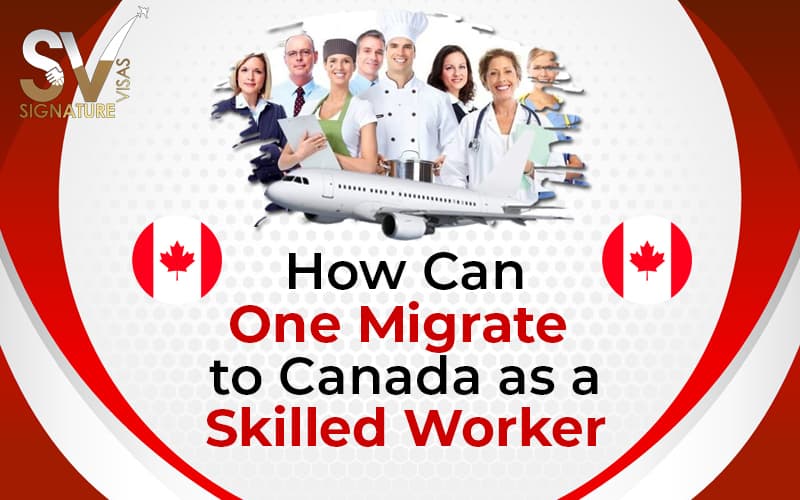
The Federal Skilled Worker (FSW) program, managed by Immigration, Refugees, and Citizenship Canada (IRCC), selects eligible foreign skilled workers according to their industry experience and relevant work experience that matches the skills of jobs mentioned in the National Occupation Classification (NOC) list. Also called Canada FSW, the federally managed program comes under the Express Entry system, an online application management system. The IRCC will invite more than 110,000 new permanent residents, immigrants, and skilled workers to Canada by 2024. Since Canadian industries, economies, and labor markets are trying to reduce the shortage of manpower to work efficiently, the priority of IRCC under the Immigration Levels Plan 2023-2025 is economic category streams like Canada FSW.
Most federal skilled worker program candidates can have bright and promising careers in Canada. Skilled workers in Canada can also gain permanent residence (PR) status within six months, which means Canada FSW is one of the easiest and fastest pathways to secure Canadian PR compared to other gateways for skilled foreign workers like the Provincial Nominee Program (PNP).
The online profiles of candidates in the Express Entry pool are assigned specific points on the Comprehensive Ranking System (CRS) scale based on human capital factors. It is important to note that only eligible candidates can submit an online profile in the Express Entry pool. The candidates score CRS points based on age, education, skill, industrial training, relevant work experience, Canadian work experience of at least one year, a valid job offer letter from a Canadian employer, sufficient funds, language ability score, adaptability, study (education) in Canada, and so on. Candidates with the highest CRS score receive an Invitation to Apply (ITA) from the IRCC to apply for permanent residence status in Canada. Eligible candidates must submit their responses and supporting documents in the next 60 days. It becomes invalid after 60 days of issuing the letter to candidates.
The cost of Canadian immigration through the Express Entry system is around $2,300 CAD per applicant and approximately $4,500 CAD for a couple. It is important to note that this cost does not include settlement funds or proof of funds, which is one of the eligibility criteria for the Canada FSW.
Potential Canada FSW applicants must meet the essential eligibility criteria for relevant work experience, language ability, and education to score at least 67 points under the program's 100-point grid.
The eligibility criteria of Canada FSW are mentioned below -
It is important to note that Canada FSW candidates should not worry if their gained work experience does not match their education. They are considered skilled workers in Canada if their relevant work experience matches the NOC skill requirements. In addition, applicants must be doing the jobs and occupations for which they claim points in the eligibility grid.
Also, applicants can gain extra CRS points under the "adaptability" factor if they have a close (or blood) relative or a family member already residing in Canada as a permanent citizen.
The Canadian provinces can nominate eligible foreign skilled workers to work and stay. The provinces nominate skilled workers in Canada to resolve the challenges of workforce shortages and the increasing number of employees reaching retirement age in different industries, manufacturing units, and labor markets. By 2025, the IRCC will invite 117,500 new immigrants through PNPs, an economic stream pathway that selects foreign skilled workers and professionals. The ten Canadian provinces and three territories nominate candidates through several pathways. Each PNP has its own eligibility criteria, depending on the requirements of in-demand jobs. Some PNPs also nominate applicants with a family member or relative residing in that province. The application processing time for PNPs is a bit longer.
Most PNPs are also aligned with the Express Entry system and are called ‘enhanced PNPs. In such cases, eligible applicants must apply to secure Canadian PR after receiving the provincial nominee certificate. The cost of Canadian immigration through PNP is the same as the Express Entry system, along with some additional fees to be charged by the provincial authorities. Some provinces do not charge an application processing fee, while others, like Ontario, charge up to $1,500 CAD as an application processing fee.
After receiving an ITA from IRCC, eligible applicants must submit supporting documents in the next 60 days to secure Canadian PR. These documents are listed below -
According to a report published by Statistics Canada, immigrants, and foreign skilled workers could be anywhere between 29.1% and 34.0% of Canada’s overall population by 2041, considering the escalation in the intake of immigrants in Canada under the Immigration Levels Plan 2023–2025. The IRCC aims to welcome as many as 465,000 new immigrants and foreign skilled workers in 2023, around 485,000 new immigrants and professionals in 2024, and a record number of 500,000 new permanent residents in 2025. Hence, interested skilled workers and professionals must apply for Canadian immigration in 2023 to secure a better future in an advanced economy.
